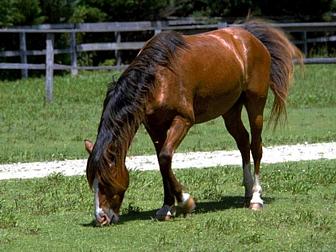
OVERVIEW
The Banker is a feral horse that has existed for centuries on the islands of North Carolina's Outer Banks. The area is known for its lack of vegetation and water. The horse population survives on the marsh grass and by scratching through the sand for water seepage. Today there are very few Bankers left due to environmental problems and management agencies.
PHYSICAL DESCRIPTION
These horses stand between 13 and 14.3 hands high and are found predominantly in brown, bay, dun, and chestnut. The Banker carries many of the same characteristics as the influential Spanish mustang-type. Unlike most wild horses, however, it is generally friendly and calm.
ORIGIN
No one is certain of the exact origin of the Banker Horse, but there is no doubt that it is of Spanish stock. The region was first colonized by Spanish explorers in the 1520s, and later again in the 1580s by the English. Both were known to have brought stock over. Whether these animals escaped, were released, or saved from shipwreck is uncertain. Whatever the case, by the 1700s horses were well documented on the Outer Banks. Because of the relatively isolated environment, the horses remain a relatively pure stock.
INTERESTING FACTS
Many of the horses that still do exist are alive thanks to the efforts of Dale Burrus, a Banker Horse enthusiast. Not only has he collected and preserved the horse, he has also sought to keep the wild population in their natural state on the islands. Differences between naturalists and horse enthusiasts are still present, leaving the future of the horse uncertain.
INFLUENCES
1.Spanish
For more information:
American Horse Council